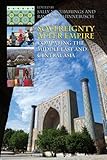Sovereignty After Empire : Comparing the Middle East and Central Asia / Sally N. Cummings, Raymond Hinnebusch.
Material type: TextPublisher: Edinburgh : Edinburgh University Press, [2022]Copyright date: ©2011Description: 1 online resource (408 p.)Content type:
TextPublisher: Edinburgh : Edinburgh University Press, [2022]Copyright date: ©2011Description: 1 online resource (408 p.)Content type: - 9780748643042
- 9780748647545
- 320.15
- DS62.8 .C384 2011
- online - DeGruyter
| Item type | Current library | Call number | URL | Status | Notes | Barcode | |
|---|---|---|---|---|---|---|---|
 eBook
eBook
|
Biblioteca "Angelicum" Pont. Univ. S.Tommaso d'Aquino Nuvola online | online - DeGruyter (Browse shelf(Opens below)) | Online access | Not for loan (Accesso limitato) | Accesso per gli utenti autorizzati / Access for authorized users | (dgr)9780748647545 |
Frontmatter -- Contents -- Acknowledgments -- Notes on the Contributors -- 1. Introduction -- SECTION I Histories of Empire and After -- 2. Russian Empires -- 3. The British and French Empires in the Arab World: Some Problems of Colonial State-formation and its Legacy -- 4. Ottoman Legacies and Economic Sovereignty in Post-imperial Anatolia, Syria and Iraq -- SECTION II Paths to Sovereignty: Views from the Core and Periphery -- 5. Sovereignty in the Ottoman Empire and After -- 6. Mandated Sovereignty? The Role of International Law in the Construction of Arab Statehood during and after Empire -- 7. Reluctant Sovereigns? Central Asian States’ Path to Independence -- SECTION III Empire and Domestic Sovereignty -- 8. The Middle East after Empire: Sovereignty and Institutions -- 9. Sovereignty after Empire: The Colonial Roots of Central Asian Authoritarianism -- SECTION IV Empire and Popular Sovereignty -- 10. Culture, Colonialism and Sovereignty in Central Asia -- 11. Culture in the Middle East: The “Western Question” and the Sovereignty of Post-imperial States in the Middle East -- 12. Pathways of Islamist Mobilization against the State in the Middle East and Central Asia -- SECTION V Empire and External Sovereignty -- 13. Empire and State formation: Contrary Tangents in Jordan and Syria -- 14. Rentierism, Dependency and Sovereignty in Central Asia -- 15. Tajikistan: From de facto Colony to Sovereign Dependency -- 16. Conclusions -- Bibliography -- Index
restricted access online access with authorization star
http://purl.org/coar/access_right/c_16ec
How does empire affect the route to successor sovereign state systems and the features of the sovereignty of these systems?This unique systematic comparison of empires and of their consequences for sovereignty in the Middle East and Central Asia brings theory on empire and sovereignty to bear on empirical variation across the two regions. The novel approach to understanding the political structures of states in two significant areas of the non-European world offers an important comparative discussion of post-imperial development and sovereignty. It raises a clear set of research questions about variations of imperial practice and puts forward an attractive and persuasive case that imperial legacy has been an important variable in the post-independence period.
Mode of access: Internet via World Wide Web.
In English.
Description based on online resource; title from PDF title page (publisher's Web site, viewed 29. Jun 2022)


